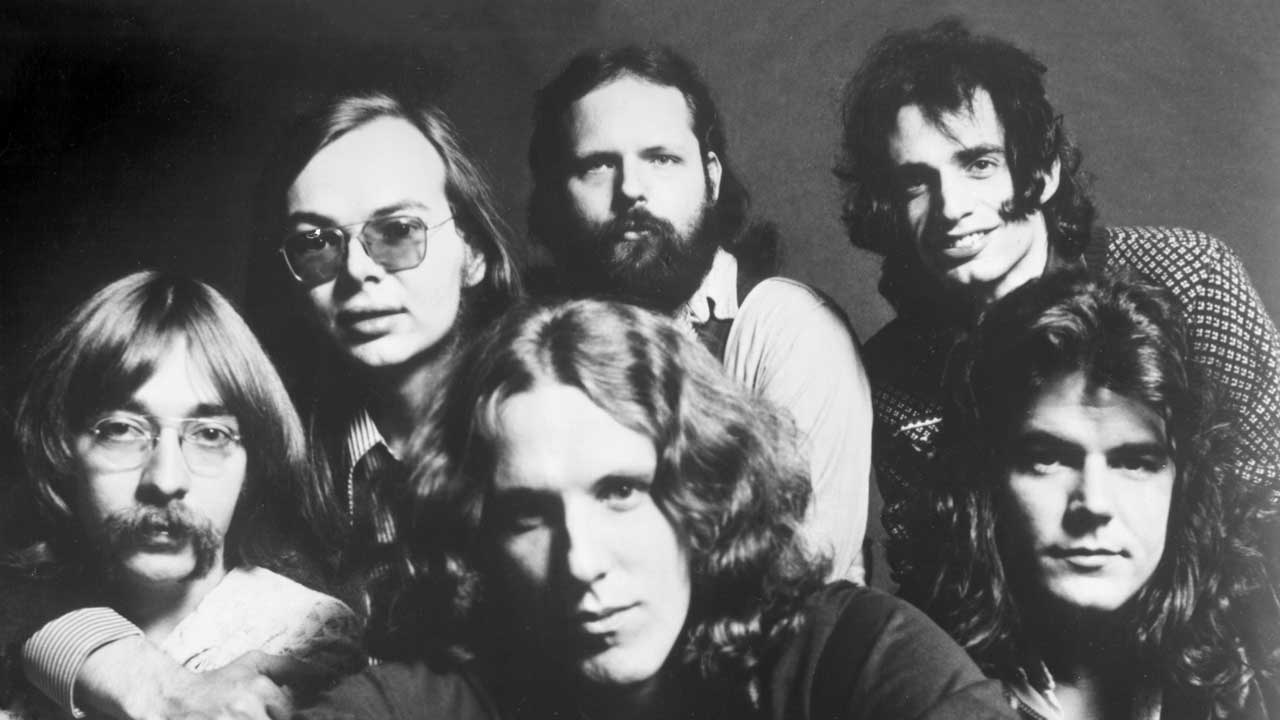Chris Catalyst on band hopping, mental health, and why he can call Ginger Wildheart “a knob”
From the Sisters Of Mercy to Ugly Kid Joe – via a superb new solo album – Chris Catalyst’s résumé is nothing if not long

Select the newsletters you’d like to receive. Then, add your email to sign up.
You are now subscribed
Your newsletter sign-up was successful
Want to add more newsletters?

Every Friday
Louder
Louder’s weekly newsletter is jam-packed with the team’s personal highlights from the last seven days, including features, breaking news, reviews and tons of juicy exclusives from the world of alternative music.

Every Friday
Classic Rock
The Classic Rock newsletter is an essential read for the discerning rock fan. Every week we bring you the news, reviews and the very best features and interviews from our extensive archive. Written by rock fans for rock fans.

Every Friday
Metal Hammer
For the last four decades Metal Hammer has been the world’s greatest metal magazine. Created by metalheads for metalheads, ‘Hammer takes you behind the scenes, closer to the action, and nearer to the bands that you love the most.

Every Friday
Prog
The Prog newsletter brings you the very best of Prog Magazine and our website, every Friday. We'll deliver you the very latest news from the Prog universe, informative features and archive material from Prog’s impressive vault.
Talking to Chris Catalyst in pubs in his Leeds stamping ground, drawn in by his offbeat wit, clocking his piercings and enjoying his pops at rock’s sacred cows (“We’ve already got one Morrissey, and that’s frankly too many”), at first you’d peg him as a talkative fellow fan. But slowly, by degrees, you’d realise this unassuming 41-year-old is actually the secret weapon of the transatlantic rock scene.
The Sisters Of Mercy. Ginger Wildheart. Ugly Kid Joe. Terrorvision. Catalyst has played with them all, and plenty more as well; it’s even rumoured that he’s one of the Nameless Ghouls in Swedish metallers Ghost.
“I’ve been lucky enough to work with some brilliant humans,” he reflects. “And some total arseholes. People often say: ‘Fucking hell, your arse never touches the floor.’ But last night I got stoned and ate an Easter egg while watching World’s Wildest Police Videos.”
This human dynamo hasn’t wasted lockdown. Today, Catalyst is plugging – and posting out copies of – his second self-released solo album, Kaleidoscopes, on which Britrock guitars collide with punky pace and nicely spikey lyrics on some impeccable songs.
“I’m done underplaying this record,” he says, beaming. “It’s got some great fucking tunes.”

It’s been a long road to get where he is today. Born Chris May and raised in the drabscape of 80s Hull, as a fledgling musician he prized songcraft, devouring the Rolling Stones, The Beatles, Dubliners and Bob Marley from his parents’ collection, before punk taught him to steep his hooks in attitude.
“The Stranglers were a big thing,” he says, “and Steve Jones is still one of the greatest guitar sounds. There were so many guys back then who could play me under the table. But then they had kids, put the guitar in the loft. And I just refused to fuck off.”
Sign up below to get the latest from Classic Rock, plus exclusive special offers, direct to your inbox!
Having moved to Leeds in 1998 for a better bite at the music industry, Catalyst was working at a radio station when Sisters Of Mercy leader Andrew Eldritch hired him as a guitarist with the band when they played live. Today Catalyst is grateful, with caveats.
“I’ll always have respect for Andrew,” he says. “He just has a different pace of doing things, which I found frustrating, because I like to be busy. That’s his prerogative, but it was tiresome at times. It was like he didn’t really want to do it, and that made it hard to enjoy at times. There was a point where I couldn’t do a tour. Instead of moving it, Andrew saw fit to get someone else in, which was a shame. But there’s no bridges burnt.”
Fronted by a similarly hyperactive band hopper, he says Ginger Wildheart’s solo band was a better fit.
“Lots of people fall out with Ginger,” he says. “I never have. So many people kiss his arse, and I don’t. I think, as a fellow working-class Northerner, he reacts well to that. I’ll tell him if he’s being a knob. And he’ll tell me. People like Ginger see through chancers and kiss-arses. If you’re born above Leicester, you’re born with an enormous bullshit detector.”
And a thirst.
“All the bands I’ve been in do like a drink,” Catalyst adds. “I’ve done gigs with the Sisters where Andrew has drunk a bottle and a half of vodka before we’ve gone on stage, and not dropped a note.”
As fellow Yorkshiremen, playing keyboards for Terrorvision computes. But aren’t Ugly Kid Joe just too American? Catalyst just chuckles at the disparity. “I was guitar tech-ing for them, and when I heard that Sonny Mayo couldn’t do a tour I said I’ll do it. Like you say, they’re Californian, sun-kissed surf-punk dudes, and then there’s this Yorkshire chancer, this spotty herbert on stage left. It almost made me more Yorkshire, like: ‘Ey oop, I’m going to get a whippet and a flat cap.’”
Catalyst concedes that he might now be a bigger name had he played the game. “People have said: ‘You should have moved to London when you had better cheekbones and more hair.’ But I was never into kissing arse. Did my bands miss out on industry interest? Yes. Would we have ended up in some kind of drug-addicted or London-addled mind-state, having to be on that roulette wheel? Probably.”
Besides, planting his flag in Leeds has allowed him to retain his artistic voice, whether in Eureka Machines, the closest thing he has to a regular band, or on latest album Kaleidoscopes.
“Divide And Rule is dead Beatles-y, like Norwegian Wood,” he says. “That’s about the Tories and the right wing – how their aim is to keep people battling against each other. King Of Everything is about people’s opinions on the internet, feeding that disinformation. Y’know, one person reads that someone’s not having the vaccine cos they’ve been told it’s got a 5G chip in it. Bouncer’s Dream is about that eighties episode of Neighbours – it’s the most psychedelic television you’ll ever see.
"I’m Not Okay is talking about mental health. I’ve had my battles. I was diagnosed with OCD three years ago. I’ve had issues with anxiety. Things that a lot of people face. Where I come from, that’s shoved under the table. It goes against my cultural prerogative to talk about it. And that can’t be a good thing. But what I’ve worked out is that I wouldn’t change how my mind works. The crux is that I am pretty happy.”
Catalyst deems Kaleidoscopes to be “a trip through my record collection”. The more you listen to these songs, the more his own voice comes to the fore, perhaps announcing that this eternal chameleon has finally found a skin he’s comfortable in.
“People spend such a long time trying to find out who they are,” he offers. “You go through phases where you’re like: ‘Well, am I Thom Yorke? Maybe I’m Kurt Cobain. What about Bob Marley? I smoke a bit of weed.’ What you suss out, in the end, is that there’s loads of fucking Freddie Mercury, Kanye West and PJ Harvey wannabes, but there’s only one you.
"And it turned out that who I am was enough for… not a lot of people, but enough to keep my career sustainable. That’s a liberating feeling."
Kaleidoscopes is out now. Visit chriscatalyst.com for more information.
Henry Yates has been a freelance journalist since 2002 and written about music for titles including The Guardian, The Telegraph, NME, Classic Rock, Guitarist, Total Guitar and Metal Hammer. He is the author of Walter Trout's official biography, Rescued From Reality, a music pundit on Times Radio and BBC TV, and an interviewer who has spoken to Brian May, Jimmy Page, Ozzy Osbourne, Ronnie Wood, Dave Grohl, Marilyn Manson, Kiefer Sutherland and many more.

